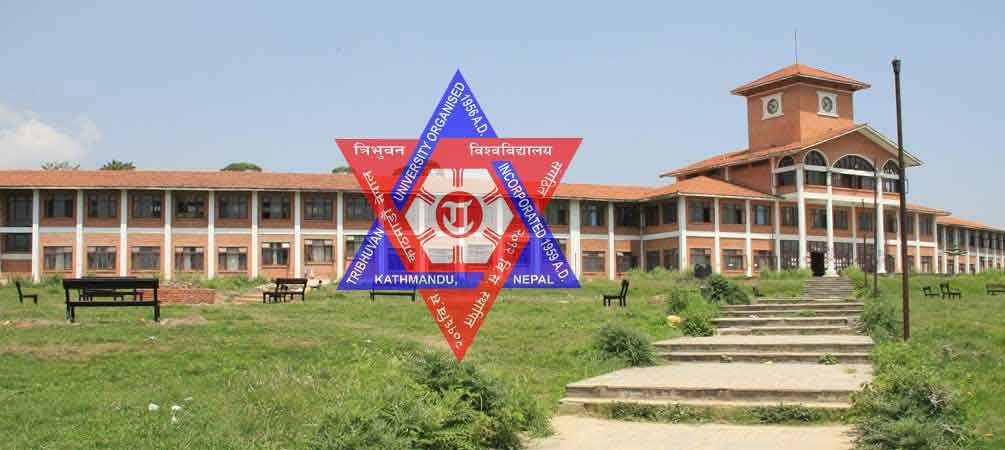
After more than a month, officials from Tribhuvan University (TU) appeared on campus in Kirtipur this Friday—but not in their offices. They were seen at the Tribhuvan Memorial Hall.
Since 2082 Jestha 14, the university’s top officials have been unable to access their offices due to vandalism and lockouts imposed by students affiliated with the Nepali Congress-aligned Nepal Student Union (NSU). For weeks, they operated from Pulchowk and various locations.
20th Ashad 2082, Friday marked the 66th anniversary of Tribhuvan University. Despite limitations, Vice Chancellor Khagendra Prasad K.C., Pro-Chancellor and Education Minister Raghuji Pant, Rector Duvinanda Dhakal, and Registrar Kedar Prasad Rijal attended the program.
Near the program venue are the offices of the Vice Chancellor, Rector, and Registrar. While the ceremony took place, all three offices remained padlocked. However, during the event at the Memorial Hall, news surfaced that “part-time faculty members had opened the locks.”
On Jestha 30, part-time faculty members locked the offices of the Vice Chancellor, Rector, Registrar, and the Service Commission in protest. Staff were also unable to access their offices and were forced to sit outside on campus grounds during the day and return home in the evening.
Partial Reopening After Faculty Action
On Friday, with the anniversary underway, the part-time faculty union opened the locks, allowing staff to enter offices. The lockout was initiated in protest of planned appointments via the fast-track system.
A public notice stated they opened the locks on the day of the university's Senate meeting (22nd), aiming to present their concerns to the Chancellor and Prime Minister.
By noon, the main doors of the top offices had been opened. Security guards were cleaning the entrance and preparing to bring in the accumulated newspapers at the Registrar’s office after 22 days. “Finally, the door has opened. But student-imposed locks inside the rooms remain,” said one guard, indicating partial reopening.
Supreme Court’s Interim Order Influences Reopening
Earlier, the Supreme Court had issued an interim order on Wednesday demanding the immediate removal of the locks at Tribhuvan University.
This ruling added pressure on part-time faculty members, contributing to their decision to unlock the offices.
However, students elected under the NSU banner in the Free Student Union (FSU) have not yet opened their locks. “Is the court’s order not applicable to students?” questioned a staff member sitting at the entrance of the Vice Chancellor’s office.
By Friday afternoon, the student-imposed locks had not been removed. After the Supreme Court’s order reached the District Administration Office via the Ministry of Home Affairs, the police began preparations to remove the locks.
“Following yesterday’s court order, I hear that some locks are being opened. Tribhuvan University faces deep complications,” said Pant. “These issues must be resolved. If we unite, we can restore the university’s legacy. It must be freed from negative political influence.”
He also expressed frustration over the attitudes of both students and faculty.
“Students and teachers have lost direction. When faculty stray from their path, students cannot be expected to stay on the right track either. The root of this problem is politics. When politics fails, all sectors suffer,” Pant added.
Other university officials refrained from commenting on the lockdown. They plan to return to their offices only after the Supreme Court’s order is fully implemented.
As Nepal’s oldest university, Tribhuvan University educates around 80% of the country’s students. According to Vice Chancellor K.C., the university now operates 157 academic units.
“There are 64 constituent campuses, 44 central departments, research centers, and dean offices—making up 157 units. Additionally, over 1,000 community and private colleges are affiliated. The university has expanded to all 77 districts,” he explained.
Exam and Result Reforms
Tribhuvan University has been criticized for delayed exams and results. However, it has recently improved its efficiency in this area.
“We have improved the examination process. Previously, it took up to 1.5 years to publish results. Now, we can do it in three months,” said K.C. “It is not unusual to complete teaching, wrap up the course on time, conduct exams, and publish results. But achieving this has become a significant accomplishment in today’s context.”
Record Number of Graduates
Due to timely results, 90,000 students are expected to graduate this year.
“We are preparing the grace list. Around 90,000 students will graduate this year—a remarkably large number. Many global universities don’t have this number of students,” said K.C.
University Services Still Lag Behind
Despite progress, K.C. admitted the university has not met expectations in student services.
Registrar Kedar Prasad Rijal emphasized the need to upgrade infrastructure.
“We are barely managing to serve 80% of Nepal’s students. Tribhuvan University remains a top choice, currently running more than 400 programs.
It has produced presidents, prime ministers, and global professionals. But we still face severe infrastructure challenges,” Rijal stated.
Although Tribhuvan University was founded on the goal of collaborative academic research between students and faculty, that goal remains unmet.
“Are we focused on generating knowledge or simply producing graduates? That is the real question,” said K.C.
Tribhuvan University

